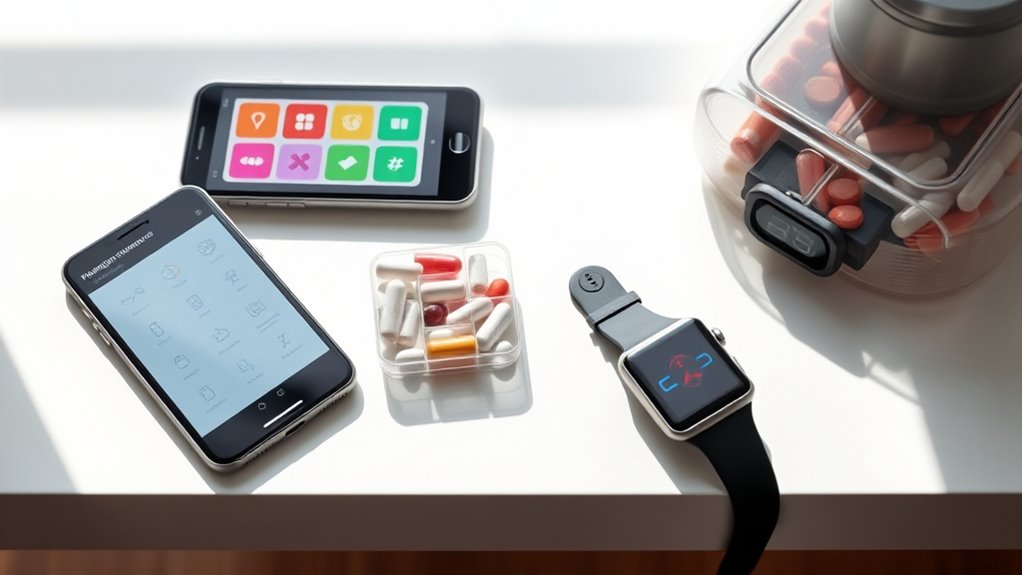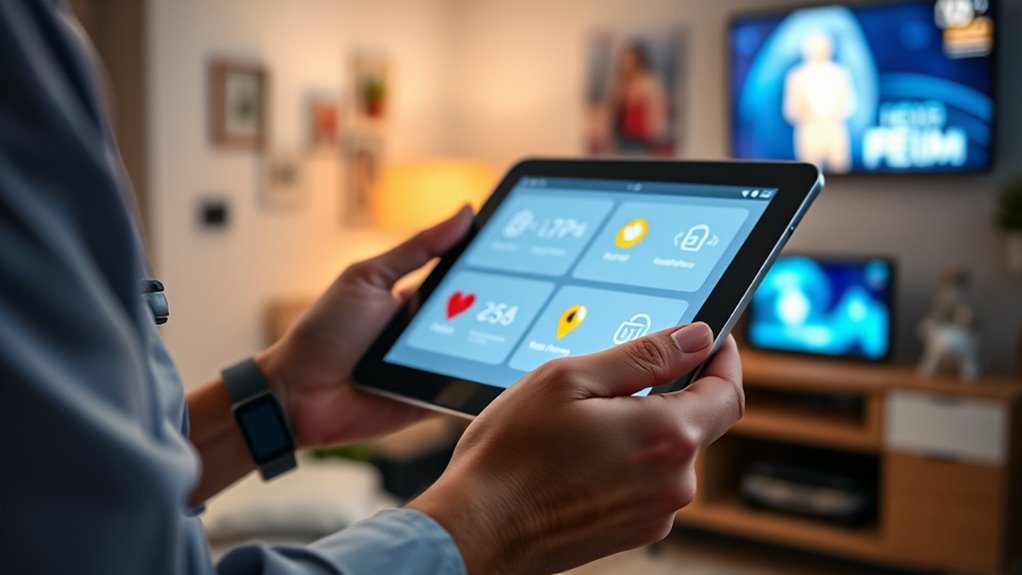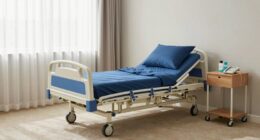To support your caregiving journey, use top tech tools like video calling apps, shared calendars, and messaging platforms to stay connected and organized. Medication management devices, such as automatic dispensers and reminder apps, guarantee safety and adherence. Safety gadgets like GPS trackers and wearable monitors help you respond quickly in emergencies. Wellness trackers monitor health, while online support groups and educational resources provide emotional support and advice. Keep exploring further to discover how these tools can simplify your daily routines.
Key Takeaways
- Communication platforms like Zoom, WhatsApp, and shared calendars enhance coordination and real-time updates among caregiving teams.
- Medication management apps such as Medisafe and smart dispensers improve safety and adherence.
- Health monitoring devices like fitness trackers and environmental sensors support proactive health and safety measures.
- Online support groups, educational resources, and expert Q&A sections foster caregiver learning and emotional resilience.
- Safety technologies including GPS tracking, wearable alerts, and home monitoring systems ensure timely emergency response.
Communication and Coordination Tools

How can caregivers stay connected and organized across different locations? Video calling apps like Skype, FaceTime, and Zoom let you have face-to-face contact, boosting emotional support and observation. Additionally, these tools can help reduce dark circles and puffiness from stress and fatigue. Regular communication can also help caregivers monitor signs of spoilage in their loved ones’ health and well-being. Many caregivers find that using communication tools such as these enhances their ability to provide timely support. Practicing mindfulness techniques can also help caregivers manage their own stress while supporting their loved ones.
Video calling apps like Skype, FaceTime, and Zoom help caregivers stay connected and offer emotional support across distances.
Online calendars such as Google Calendar and Cozi help you keep track of appointments, medication times, and daily routines, ensuring everyone stays on the same page.
Messaging platforms like WhatsApp and Facebook Messenger enable instant updates, quick communication, and real-time support among family members and healthcare providers.
Caregiving apps like CareZone and Lotsa Helping Hands streamline task management and coordination, making teamwork smoother.
Shared calendars and messaging tools enhance communication and team collaboration, reduce misunderstandings, and promote timely responses, helping you manage caregiving routines efficiently across different locations. Additionally, utilizing user consent management practices ensures that all communication tools respect privacy and data protection.
Medication Management Devices and Apps

Are you guaranteeing your loved one takes their medication correctly and on time? Medication management devices like automatic pill dispensers help ensure proper dosing and timing, reducing medication errors. Apps such as Medisafe and CareZone provide customizable reminders and track adherence, boosting medication safety. Refill alert systems notify you when prescriptions are low, preventing missed doses. Smart pill dispensers can connect with smartphones and healthcare providers for remote monitoring of medication intake. This technology improves medication safety and adherence, decreasing hospital readmissions related to errors by up to 30%. Additionally, the integration of on-device AI capabilities in these applications allows for more personalized user experiences. Furthermore, just as color accuracy enhances visual experiences in home cinema projectors, ensuring precise medication management can significantly improve patient outcomes. Moreover, the use of efficient heating and cooling systems in home environments can also lead to improved comfort and well-being, paralleling the benefits of effective medication management. Additionally, the use of airless paint sprayers in home projects can exemplify how technology enhances efficiency and effectiveness in various tasks. The implementation of smart technology in healthcare, including medication management, is becoming increasingly essential for improving patient care and safety.
| Device Type | Key Feature |
|---|---|
| Automatic pill dispensers | Correct dosing and timing |
| Apps like Medisafe | Reminders and adherence tracking |
| Refill alert systems | Prevent missed doses |
| Smart dispensers | Remote monitoring with providers |
Personal Safety and Monitoring Technologies

Building on medication management, personal safety and monitoring technologies provide an added layer of protection for your loved ones. Wearable devices like fall detection pendants and smartwatches automatically alert you or emergency services within seconds of a fall, ensuring rapid response.
GPS tracking helps locate seniors prone to wandering, especially those with dementia, enhancing safety and preventing injuries. Home monitoring systems with environmental sensors detect hazards and monitor activity levels, alerting you to unusual inactivity or risks.
Emergency alert systems with safety monitoring enable immediate communication during emergencies, while environmental sensors improve overall safety at home. Real-time monitoring offers peace of mind, and caregiver support is strengthened through these technologies, making it easier to ensure your loved one’s safety and well-being. Additionally, incorporating nutritional insights into their care routine can promote overall health and well-being.
Health and Wellness Tracking Solutions

Health and wellness tracking solutions like fitness trackers and smartwatches empower you to monitor essential signs, activity levels, and sleep patterns in real time. Wearable devices provide accurate health monitoring, helping you track vital signs, activity, and sleep analysis to support overall well-being. These tools facilitate health data sharing with healthcare providers, enabling proactive care and early detection of potential issues. With features like activity tracking and sleep analysis, you can identify patterns and make informed decisions about nutrition management and lifestyle changes. Moreover, using romantic love shayari can help caregivers express their feelings and bond with their loved ones, enhancing emotional well-being. Many devices also include emergency alerts for urgent situations. Additionally, incorporating air purification technology into your home can further enhance your health by reducing allergens and pollutants in your living environment. Furthermore, using automation in data analysis can help caregivers make more informed decisions based on real-time health insights. Moreover, the integration of AI in healthcare can significantly enhance the accuracy and effectiveness of health monitoring solutions. Regular use of these technologies can lead to improved overall well-being, making it easier for caregivers to support their loved ones effectively.
Resources for Support and Education

Leveraging technology not only helps monitor health but also provides essential resources for support and education. Online resources, such as caregiver support groups like the Caregiver Action Network and AgingCare, offer peer advice, emotional support, and access to community services 24/7, reducing feelings of isolation. Additionally, electric dirt bikes are an exciting option for caregivers looking for alternative transportation methods while managing their responsibilities. The cost of home security systems can vary widely, ensuring that caregivers can find a solution that fits their budget. Establishing a consistent routine can help caregivers better manage their time and responsibilities, especially when caring for newborns who require consistent sleep patterns. Moreover, utilizing AI technologies can enhance communication and streamline caregiving tasks, improving overall efficiency.
Educational platforms like AARP Caregiving and WebMD deliver evidence-based caregiving education through webinars, articles, and virtual training modules, boosting your confidence in managing complex health issues. Additionally, exploring wax-free candle techniques can offer a creative outlet for caregivers seeking relaxation and stress relief.
Digital tools include directories for respite care, legal assistance, and other community services, making support easily accessible. Many websites feature forums and expert Q&A sections, allowing you to share experiences and gain insights from professionals, fostering a well-rounded approach to caregiving support and education.
Frequently Asked Questions
What Are the Digital Tools for Caregivers?
You can use digital tools like apps and platforms to manage medications, appointments, and health data easily.
Telemedicine lets you consult with doctors remotely, saving you trips.
Wearables and sensors monitor essential signs and activity, alerting you to issues.
Communication apps keep you connected with family and healthcare providers quickly.
Safety devices like GPS trackers and medical alerts help guarantee your loved ones stay safe and receive help when needed.
What Do Caregivers Need the Most?
You need reliable communication tools to stay connected with loved ones and healthcare providers.
Medication reminders help you manage treatments effectively, preventing health issues.
Safety devices like alert systems give you peace of mind during emergencies.
Remote health monitoring keeps an eye on health without constant visits.
Emotional support networks reduce stress and loneliness.
Prioritizing these essentials guarantees you can provide the best care while caring for yourself.
What Are the Tools and Equipment Used in Caregiving 10?
You use a variety of tools and equipment to make caregiving easier. Medication reminders and automatic pill dispensers keep your loved ones on track with their meds.
Safety devices like medical alert systems, fall detectors, and GPS trackers guarantee quick help and peace of mind.
Home automation, monitoring sensors, and cameras help you oversee their environment remotely.
Communication apps and support networks keep you connected and coordinated for better care.
What New Technologies or Tools Could Improve the Efficiency and Effectiveness in Caregiving Tasks?
Imagine your daily caregiving tasks becoming smoother, like a well-oiled machine. New technologies can make this happen by offering AI virtual assistants to handle schedules, wearable monitors that alert you instantly to emergencies, and smart home systems that adapt to your loved one’s needs.
Telehealth platforms let you coordinate care effortlessly, while automated medication dispensers reduce errors. These tools transform chaos into calm, making your caregiving more efficient and effective.
Conclusion
By exploring these top technology tools, you’ll find yourself better equipped to navigate caregiving’s twists and turns. Think of these tools as your trusted compass, guiding you through challenges with confidence and ease. Embracing technology doesn’t just make caregiving more manageable—it transforms it into a journey you can confidently steer. With the right tools in your arsenal, you’re not just caring for others—you’re empowering yourself every step of the way.









